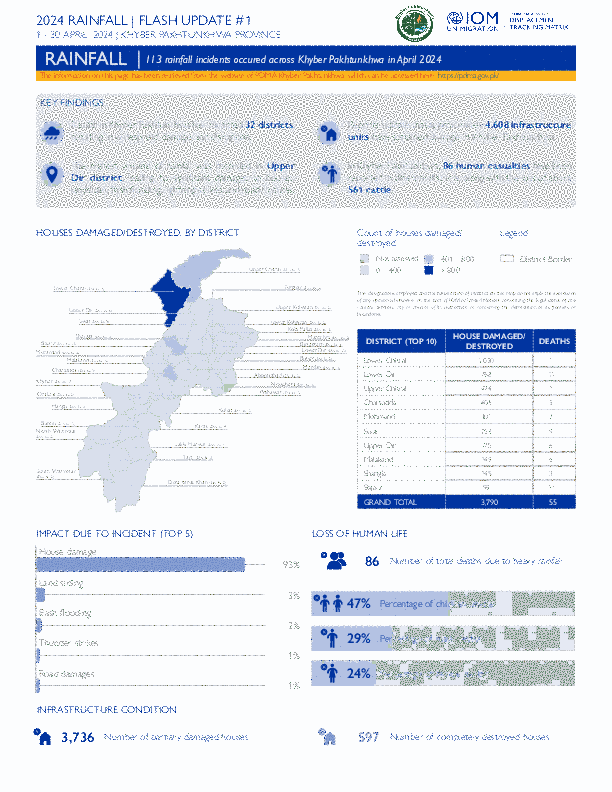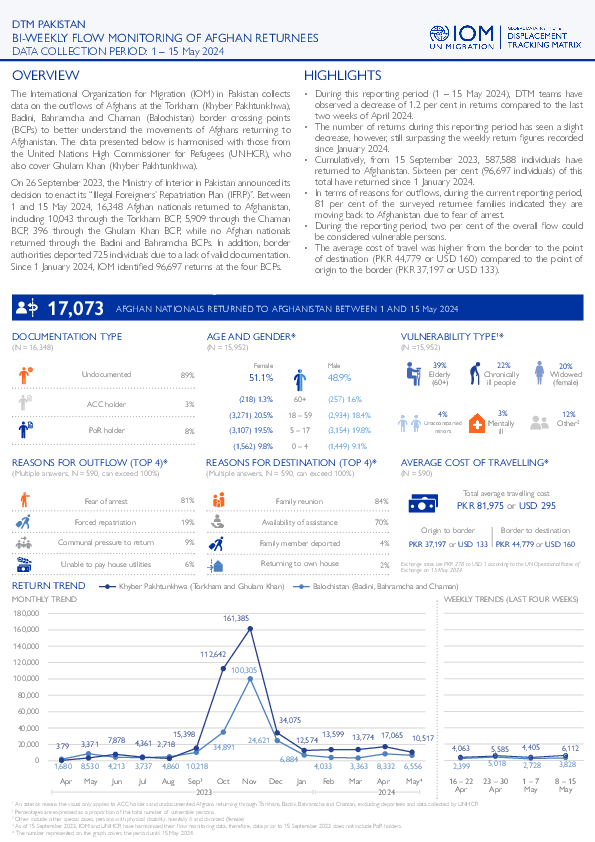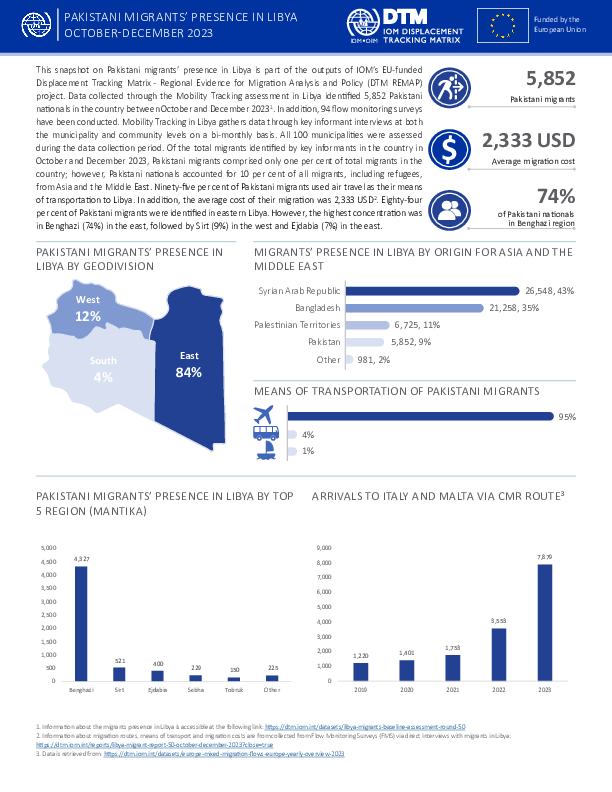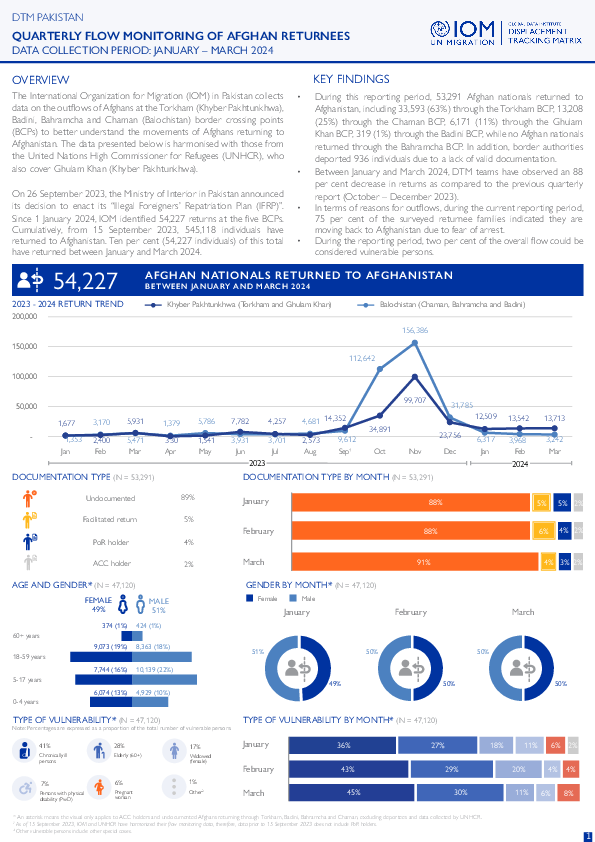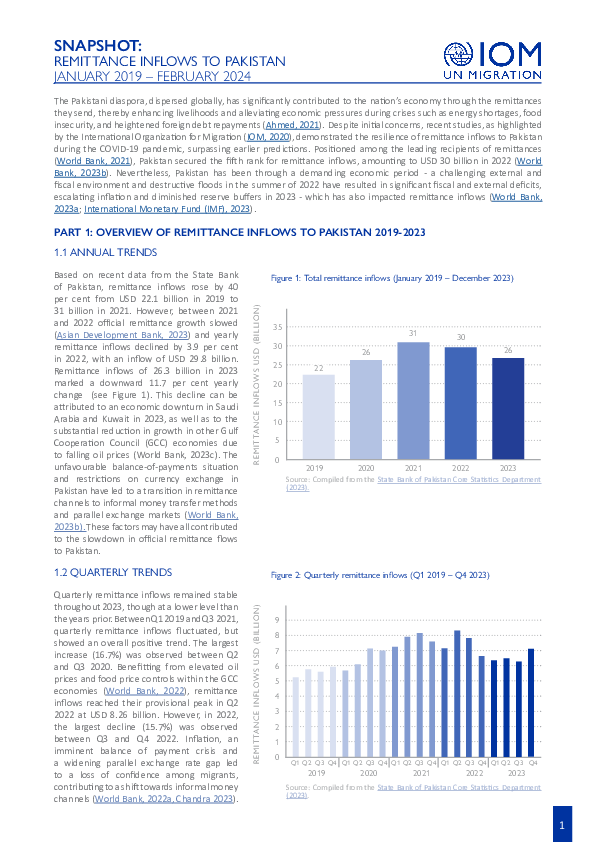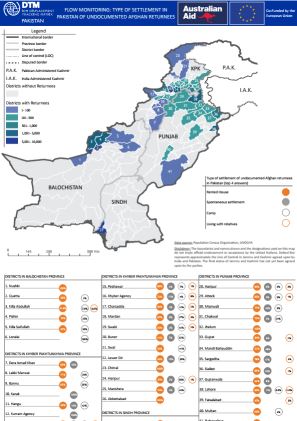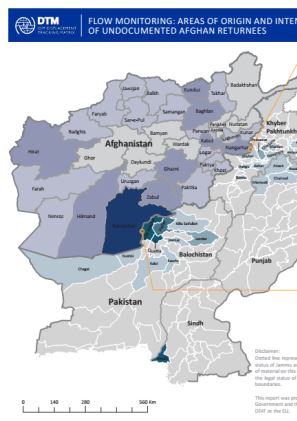-
Countries
-
Data and Analysis
-
Special Focus
-
Crisis Responses
Pakistan
Pakistan
TDPs tracked
Mouvements de déplacement
23,000
IDMC 2023
cycle de collecte de données
À propos Pakistan
In 2010, IOM’s Displacement Tracking Matrix (DTM) programme started its activities in Pakistan as part of IOM’s emergency flood response programme. Over the years, DTM has evolved into a comprehensive programme covering a wide range of activities. The DTM programme works closely together with a wide array of stakeholders, including government ministries and national and sub-national statistical organizations, UN agencies, and specialized research institutes. Its activities are instrumental in providing stakeholders with an evidence-base to effectively address humanitarian, transition, and development needs within the country.
In 2017, DTM started the implementation of its Flow Monitoring (FM) activities. DTM collects FM data at the Torkham (Khyber Pakthunkhwa), Chaman, Badini and Bahramcha (Balochistan) border crossing points (BCPs) to identify cross-mobility patterns and profiles of Afghans who are returning from Pakistan to Afghanistan. The data presented in FM information products is harmonized with those from the United Nations High Commissioner for Refugees (UNHCR), who also cover Ghulam Khan (Khyber Pakhtunkhwa). DTM Pakistan also actively coordinates its data collection efforts with the DTM programme in Afghanistan.
As part of the 2022 flood response, DTM launched mobility tracking operations in flood-affected settlements or settlements that hosted temporary displaced persons (TDPs) across 11 districts in Balochistan and Sindh to provide partners with timely information on the displacement situation. Since then, DTM’s mobility tracking has expanded to cover 30 districts across three provinces (Balochistan, Sindh and Khyber Pakhtunkhwa) and collects information on the multisectoral needs and recovery needs at the settlement level, in addition to the displacement situation.
In May 2023, DTM scaled-up its mobility tracking efforts to support the ongoing response efforts for Afghans in Pakistan. DTM’s Afghan response has been implemented in 33 districts across Balochistan, Khyber Pakhtunkhwa, Islamabad, Punjab, and Sindh, and aims to provide stakeholders with up-to-date information on the multisectoral needs of Afghans in the country.
Furthermore, under the European funded project “Displacement Tracking Matrix Regional Evidence for Migration Analysis and Policy (DTM REMAP), from 2019 to 2022, DTM implemented two household surveys. The first survey was the survey on Drivers of Migration (SDM) which aimed at better understanding the drivers of Pakistani international out-migration. The second survey was the “Returnee Longitudinal Survey (RLS)”. The purpose of RLS was to improve understanding of return migrants’ profiles, vulnerabilities and needs, as well as sustainable return and reintegration outcomes in the short- and medium-term.
Contacter
DTM Pakistan
DTMPakistan@iom.int
Bailleurs de fonds
- EU-INTPA
- ECHO
- Ministry of Foreign Affairs of Italy
- PRM
- Canada – IRCC
- Canada (DFATD)
- Netherlands
Pakistan — Flow Monitoring of Afghan Returnees — Bi-Weekly Report (1 – 15 November 2024)
The International Organization for Migration (IOM) Pakistan’s FM provides key insights into the overall migration trends of Afghan nationals returning to Afghanistan, as well as an overview of the profiles of Afghan returnees and their mobility patterns, exploring routes, vulnerabilities, demogra
Pakistan — Flow Monitoring of Afghan Returnees — Bi-Weekly Report (16 – 31 October 2024)
The International Organization for Migration (IOM) Pakistan’s FM provides key insights into the overall migration trends of Afghan nationals returning to Afghanistan, as well as an overview of the profiles of Afghan returnees and their mobility patterns, exploring routes, vulnerabilities, demogra
Pakistan — Flow Monitoring of Afghan Returnees — Quarterly Report (July - September 2024)
In Pakistan, Flow Monitoring has been established since 2016 and provides key insights into the overall migration trends of Afghan nationals returning to Afghanistan.
Pakistan — Flow Monitoring of Afghan Returnees — Bi-Weekly Report (1 – 15 October 2024)
The International Organization for Migration (IOM) Pakistan’s FM provides key insights into the overall migration trends of Afghan nationals returning to Afghanistan, as well as an overview of the profiles of Afghan returnees and their mobility patterns, exploring routes, vulnerabilities, demogra
Pakistan — Flow Monitoring of Afghan Returnees — Bi-Weekly Report (16 – 30 September 2024)
The International Organization for Migration (IOM) Pakistan’s FM provides key insights into the overall migration trends of Afghan nationals returning to Afghanistan, as well as an overview of the profiles of Afghan returnees and their mobility patterns, exploring routes, vulnerabilities, demogra
Pakistan — Quarterly Flow Monitoring of Afghan Returnees (April- June 2024)
This report provides key insights into the overall migration trends of Afghan nationals returning to Afghanistan, as well as an overview of the profiles of Afghan returnees and their mobility patterns, exploring routes, vulnerabilities, demographics and social characteristics.
Pakistan — Flow Monitoring of Afghan Returnees — Bi-Weekly Report (1 – 15 September 2024)
The International Organization for Migration (IOM) Pakistan’s FM provides key insights into the overall migration trends of Afghan nationals returning to Afghanistan, as well as an overview of the profiles of Afghan returnees and their mobility patterns, exploring route
Pakistan — Flow Monitoring of Afghan Returnees — Bi-Weekly Report (16 – 31 August 2024)
The International Organization for Migration (IOM) Pakistan’s FM provides key insights into the overall migration trends of Afghan nationals returning to Afghanistan, as well as an overview of the profiles of Afghan returnees and their mobility patterns, exploring route
Pakistan — Flow Monitoring of Afghan Returnees — Bi-Weekly Report (1 – 15 August 2024)
The International Organization for Migration (IOM) Pakistan’s Flow Monitoring (FM) provides key insights into the overall migration trends of Afghan nationals returning to Afghanistan, as well as an overview of the profiles of Afghan returnees and their mobility patterns, exploring routes, vulner
Pakistan — Flow Monitoring of Afghan Returnees — Bi-Weekly Report (16 – 31 July 2024)
The International Organization for Migration (IOM) Pakistan’s FM provides key insights into the overall migration trends of Afghan nationals returning to Afghanistan, as well as an overview of the profiles of Afghan returnees and their mobility patterns, exploring routes, vulnerabilities, demogra
Pakistan — Flow Monitoring of Afghan Returnees — Bi-Weekly Report (1 – 15 July 2024)
The International Organization for Migration (IOM) Pakistan’s FM provides key insights into the overall migration trends of Afghan nationals returning to Afghanistan, as well as an overview of the profiles of Afghan returnees and their mobility patterns, exploring routes, vulnerabilities, demogra
Pakistan – Afghan Response Community Needs Identification (CNI) | Round 1 | August – September 2023
The International Organization for Migration’s (IOM) CNI is used to provide a baseline on living conditions and needs of Afghan nationals in identified settlements rather than providing a detailed overview of multisectoral needs.
Pakistan — Flow Monitoring of Afghan Returnees — Bi-Weekly Report (16 – 30 June 2024)
The International Organization for Migration (IOM) in Pakistan collects data on the outflows of Afghans at the Torkham (Khyber Pakhtunkhwa), Badini, Bahramcha and Chaman (Balochistan) border crossing points (BCPs) to better understand the movements of Afghans returning
Pakistan – 2024 Rainfall | Flash Update #2 | 1 April – 31 May | Khyber Pakhtunkhwa
Rainfall in Khyber Pakhtunkhwa has impacted 8 districts, resulting in widespread damage and disruption. The highest volume of rainfall was recorded in Lakki Marwat district, leading to damages to houses, landslides, flash flooding, lightning strikes,
Pakistan — Flow Monitoring of Afghan Returnees — Bi-Weekly Report (1 – 15 June 2024)
The International Organization for Migration (IOM) in Pakistan collects data on the outflows of Afghans at the Torkham (Khyber Pakhtunkhwa), Badini, Bahramcha and Chaman (Balochistan) border crossing points (BCPs) to better understand the movements of Afghans returning to Afghanistan.
Pakistan — Flow Monitoring of Afghan Returnees — Bi-Weekly Report (16 – 31 May 2024)
The International Organization for Migration (IOM) in Pakistan collects data on the outflows of Afghans at the Torkham (Khyber Pakhtunkhwa), Badini, Bahramcha and Chaman (Balochistan) border crossing points (BCPs) to better understand the movements of Afghans returning
Pakistan — 2024 Rainfall | Flash Update #1 | 1 – 30 April 2024 | Khyber Pakhtunkhwa
Rainfall in Khyber Pakhtunkhwa has impacted 32 districts, resulting in widespread damage and disruption. Reports indicate that approximately 4,608 infrastructure units have sustained damage in Khyber Pakhtunkhwa.
Pakistan — Flow Monitoring of Afghan Returnees — Bi-Weekly Report (1 -15 May 2024)
The International Organization for Migration (IOM) in Pakistan collects data on the outflows of Afghans at the Torkham (Khyber Pakhtunkhwa), Badini, Bahramcha and Chaman (Balochistan) border crossing points (BCPs) to better understand the movements of Afg
Pakistan — Flow Monitoring of Afghan Returnees — Bi-Weekly Report (16 - 30 April 2024)
The International Organization for Migration (IOM) in Pakistan collects data on the outflows of Afghans at the Torkham (Khyber Pakhtunkhwa), Badini, Bahramcha and Chaman (Balochistan) border crossing points (BCPs) to better understand the movements of Afghans returning to Afghanistan.
Pakistani Migrants' Presence in Libya (October - December 2023)
This snapshot on Pakistani migrants’ presence in Libya is part of the outputs of IOM’s EU-funded Displacement Tracking Matrix - Regional Evidence for Migration Analysis and Policy (DTM REMAP) project.
Apr 29 2024
Pakistani Migrants' Presence in Libya (Octobe…
Pakistan — Quarterly Flow Monitoring of Afghan Returnees (January - March 2024)
The International Organization for Migration (IOM) in Pakistan collects data on the outflows of Afghans at the Torkham (Khyber Pakhtunkhwa), Badini, Bahramcha and Chaman (Balochistan) border crossing points (BCPs) to better understand the movements of Afghans returning to Afghanistan.
Flow Monitoring of Afghan Returnees (1 - 15 April)
The International Organization for Migration (IOM) in Pakistan collects data on the outflows of Afghans at the Torkham (Khyber Pakhtunkhwa), Badini, Bahramcha, and Chaman (Balochistan) border crossing points (BCPs) to better understand the movements of Afghans returning to Afghanistan.
Pakistan – Snapshot of Remittance Inflows to Pakistan between January 2019 and February 2024
This report on remittance inflows to Pakistan from 2019 to 2024 details the fluctuating trends in money sent home by the Pakistani diaspora. The report highlights the economic impact of these financial transfers.
Pakistan — Flow Monitoring of Afghan Nationals — Annual Report (2023)
This report presents a comprehensive analysis of the movement trends involving Afghan returnees from Pakistan.
Pagination
Pakistan - Flow Monitoring Registry - 2023
2023-12-31
<p>The International Organization for Migration (IOM) in Pakistan collects data on the outflows of Afghans at the Torkham (Khyber Pakhtunkhwa) and Chaman (Balochistan) border crossing points (BCPs) to better understand the movements of Afghans returning to Afghanistan. The dataset is…
Pakistan – Community Needs Identification (Flood Response) – Round 4
2023-08-31
<p>In round 4, <strong>1,340,621</strong> TDP individuals and <strong>2,633,435</strong> TDP returnees were identified in Khyber Pakhtunkhwa, Balochistan, and Sindh province.</p>
Pakistan – Community Needs Identification (Flood Response) – Round 3
2023-06-30
<p><strong>1,554,411</strong> TDP individuals and <strong>202,161</strong> TDP households were identified in Khyber Pakhtunkhwa, Balochistan, and Sindh province in Round 3.</p>
Pakistan – Community Needs Identification (Flood Response) – Round 2
2023-03-28
<p>An estimated total of 318,829 temporary displaced persons (TDPs) were identified during round 2 in the 19 assessed districts of Balochistan and Khyber Pakhtunkhwa. Sixty per cent of TDP households (27,092) were living in temporary structures (i.e. tents or emergency shelter).</p>
Pakistan – Community Needs Identification (Flood Response) – Round 1
2023-01-12
<p>An estimated total of 1,591,367 temporary displaced persons (TDPs) were identified during this round in the 18 districts of Balochistan, Khyber Pakhtunkhwa and Sindh. Fifty-five per cent of TDP households (113,070) were living in temporary structures (i.e. tents or emergency shelter).</…
Pakistan - Flow Monitoring Registry - 2022
2022-12-31
The number of undocumented Afghans returning from Pakistan has increased significantly, nearly threefold, in comparison to 2021. This rise in returns can be attributed to the significant geopolitical changes that took place in Afghanistan between 2021 and 2022. The data also shows that the number…
Pakistan - Flow Monitoring Registry - 2021
2021-12-31
27,829 undocumented returnees were reported to have crossed the two borders, out of which 14,185 were females and 13,644 were males. Additionally, border authorities facilitated the return of 1,740 individuals due to the lack of legal documentation to remain in Pakistan. Therefore, information…
Pakistan - Flow Monitoring Registry - 2020
2020-12-31
The number of returnees has decreased significantly in comparison to the previous year, 6,661 individuals in 2020 compared to 17,286 in 2019. Besides a variety of push and pull factors, the steep decline in return movements can also be attributed to the closure of the borders due to the COVID-19…
Pakistan - Flow Monitoring Registry - 2019
2019-12-31
Between January 1 and 31 December 2019, the Displacement Tracking Matrix (DTM) recorded 17,286 undocumented Afghan nationals returning from Pakistan to Afghanistan through the Chaman and Torkham border crossings, each accounting for 74 per cent and 26 percent of the total border crossings. The…
Pakistan - Flow Monitoring Registry - 2018
2018-12-31
During this period, the Displacement Tracking Matrix (DTM) recorded 30,413 Afghan nationals returning to Afghanistan from Pakistan through the Torkham (55%) and Chaman (45%) border crossings. One in two recorded returnees was a child (56%). Out of the total returnees, 71 per cent were undocumented…
Pakistan - Flow Monitoring Registry - 2017
2017-12-31
Since January 2017, overall, 97,225 returnees have been reported returning through Torkham and Chaman/Spin Boldak.
Pakistan - Site Assessment - Round 6
2012-02-21
<p>13,325 IDP individuals and 2,533 IDP households were identified in Round 6.</p>
Pakistan - Site Assessment - Round 5
2012-01-18
<p>55,953 IDP individuals and 10,379 IDP households were identified in Round 5.</p>
Pakistan - Site Assessment - Round 4
2011-12-26
<p>225,472 IDP individuals and 42,447 IDP households were identified in Round 4.</p>
Pakistan - Site Assessment - Round 3
2011-11-23
<p>454,476 IDP individuals and 86,647 IDP households were identified in Round 3.</p>
Pakistan –Map - Type Of Settlement In Pakistan Of Undocumented Afghan Returnees (2019)
This map provides information on the type of settlements in Pakistan of Undocumented Afghan returnees during the period between January 1 and 31 December 2019. In 2019, a rented house was the most common type of settlement for undocumented returnees in Pakistan. However, the type of settlement differs according to the different districts.
Pakistan – Map – Type of Settlement in Pakistan of Undocumented Afghan Returnees (2020)
This map provides information on the type of settlements in Pakistan of Undocumented Afghan returnees during the period between January 1 and 31 December 2020. In 2020, a rented house was the most common type of settlement for undocumented returnees in Pakistan. However, the type of settlement differs according to the different districts.
Pakistan – Map - Areas of Origin and Intended Destination of Undocumented Afghan Returnees (2020)
This map provides information on the districts of origin in Pakistan and the intended provinces of destination in Afghanistan during the period between January 1 and 31 December 2020. The majority of undocumented Afghan returnees came from five districts in Pakistan: Killa Abdullah, Quetta, Karachi, Pishin and Peshawar. The main intended destination provinces in Afghanistan of undocumented returnees were Kandahar, Kunduz, Kabul, Nangarhar and Hilmand.


















